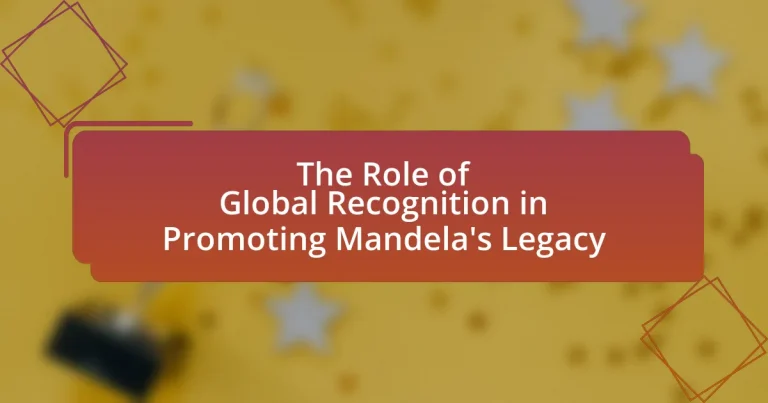The article examines the significant role of global recognition in promoting Nelson Mandela’s legacy, emphasizing how international honors and commemorative events amplify his values of peace, equality, and social justice. It highlights the impact of initiatives like Nelson Mandela International Day and the Nobel Peace Prize on public perception and understanding of his contributions to human rights. Additionally, the article discusses the mechanisms through which global recognition is achieved, the challenges in maintaining it, and the actions individuals and grassroots movements can take to further promote Mandela’s ideals. Overall, it underscores the importance of global acknowledgment in preserving and propagating Mandela’s legacy for future generations.
What is the Role of Global Recognition in Promoting Mandela’s Legacy?
Global recognition plays a crucial role in promoting Nelson Mandela’s legacy by amplifying his values of peace, equality, and social justice on an international scale. This recognition manifests through various global honors, such as the United Nations declaring July 18 as Nelson Mandela International Day, which encourages individuals to engage in community service and reflect on Mandela’s contributions to humanity. Such initiatives not only celebrate his life but also inspire global movements for human rights and social change, reinforcing the principles he stood for. Furthermore, Mandela’s legacy is preserved and propagated through educational programs and commemorative events worldwide, ensuring that future generations understand and embrace his ideals.
How does global recognition influence the perception of Mandela’s legacy?
Global recognition significantly enhances the perception of Nelson Mandela’s legacy by framing him as a universal symbol of peace and justice. This recognition is evidenced by his numerous international awards, including the Nobel Peace Prize in 1993, which solidified his status as a global leader in the fight against apartheid and for human rights. Furthermore, Mandela’s legacy is celebrated through global events such as Nelson Mandela International Day, established by the United Nations in 2009, which encourages individuals to engage in community service, thereby reinforcing his ideals of altruism and social justice worldwide. This widespread acknowledgment not only elevates Mandela’s contributions but also inspires ongoing movements for equality and human rights, demonstrating the lasting impact of his legacy on a global scale.
What are the key elements of Mandela’s legacy that benefit from global recognition?
The key elements of Mandela’s legacy that benefit from global recognition include his commitment to human rights, reconciliation, and social justice. Mandela’s advocacy for equality and his role in dismantling apartheid in South Africa serve as a powerful symbol for movements against oppression worldwide. His emphasis on forgiveness and unity, particularly during the transition from apartheid, has inspired global leaders and activists to pursue peaceful resolutions to conflicts. Furthermore, Mandela’s establishment of the Nelson Mandela Foundation promotes education and social justice initiatives, reinforcing his values on a global scale. These elements are recognized internationally, as evidenced by Mandela receiving over 250 awards, including the Nobel Peace Prize in 1993, highlighting the global impact of his legacy.
How does global recognition shape public understanding of Mandela’s contributions?
Global recognition significantly shapes public understanding of Nelson Mandela’s contributions by elevating his status as a symbol of peace and justice worldwide. This recognition, exemplified by the Nobel Peace Prize awarded to Mandela in 1993, highlights his role in dismantling apartheid and promoting reconciliation in South Africa. Such accolades not only validate his efforts but also educate the global audience about the complexities of his struggle, fostering a deeper appreciation for his commitment to human rights and equality. Consequently, this widespread acknowledgment influences how individuals and societies perceive the importance of his legacy in contemporary discussions on social justice and activism.
Why is global recognition important for preserving Mandela’s legacy?
Global recognition is crucial for preserving Mandela’s legacy because it amplifies his message of peace, equality, and justice worldwide. This recognition fosters a collective memory that honors his contributions to the anti-apartheid movement and human rights advocacy. For instance, the establishment of International Nelson Mandela Day on July 18 promotes community service and social justice, encouraging individuals globally to engage in activities that reflect Mandela’s values. Such initiatives ensure that his ideals remain relevant and inspire future generations to continue the fight against oppression and inequality.
What impact does global recognition have on educational initiatives related to Mandela?
Global recognition significantly enhances educational initiatives related to Nelson Mandela by increasing awareness and funding for programs that promote his values of equality, justice, and reconciliation. This recognition often leads to the establishment of educational curricula and institutions that focus on Mandela’s life and principles, such as the Nelson Mandela Foundation’s educational programs, which aim to inspire future generations. Furthermore, global acknowledgment of Mandela’s contributions encourages partnerships between educational institutions worldwide, facilitating the exchange of resources and knowledge that further enriches these initiatives.
How does global recognition foster international solidarity with Mandela’s ideals?
Global recognition fosters international solidarity with Mandela’s ideals by amplifying his message of equality, justice, and human rights on a worldwide scale. This recognition, exemplified by events such as Nelson Mandela International Day, encourages global citizens to engage in community service and advocacy, thereby aligning their actions with Mandela’s vision. Furthermore, the widespread acknowledgment of Mandela’s contributions to the anti-apartheid movement and his promotion of reconciliation inspires collective efforts against oppression and injustice globally, as seen in various movements advocating for social justice and human rights. The establishment of the Nelson Mandela Foundation also serves as a platform for promoting his ideals, facilitating international partnerships that further the cause of equality and peace, thus reinforcing solidarity among nations committed to these principles.
What are the mechanisms through which global recognition is achieved?
Global recognition is achieved through mechanisms such as international diplomacy, cultural exchange, and media representation. International diplomacy involves countries and organizations formally acknowledging and promoting an individual or cause, as seen in the global recognition of Nelson Mandela through various international awards and honors, including the Nobel Peace Prize in 1993. Cultural exchange fosters understanding and appreciation of a legacy through art, literature, and education, exemplified by the establishment of Mandela Day, which encourages global citizens to engage in community service. Media representation amplifies awareness and support, as global news outlets and social media platforms disseminate stories and achievements related to Mandela, thereby solidifying his impact on human rights and social justice worldwide.
How do international awards and honors contribute to Mandela’s legacy?
International awards and honors significantly enhance Mandela’s legacy by recognizing his contributions to peace, justice, and human rights. These accolades, such as the Nobel Peace Prize awarded to him in 1993, serve to validate his efforts in dismantling apartheid and promoting reconciliation in South Africa. The global recognition not only immortalizes his achievements but also inspires future generations to advocate for social justice and equality. Furthermore, awards like the United Nations Nelson Mandela International Day, established in 2010, encourage individuals and organizations worldwide to engage in community service, thereby perpetuating Mandela’s values and ideals. This ongoing recognition reinforces the importance of his legacy in contemporary discussions about human rights and social change.
What role do global events and commemorations play in promoting Mandela’s legacy?
Global events and commemorations play a crucial role in promoting Nelson Mandela’s legacy by fostering awareness and inspiring action towards social justice and human rights. These events, such as Nelson Mandela International Day on July 18, encourage individuals and organizations worldwide to engage in community service and advocacy, reflecting Mandela’s commitment to equality and service. For instance, the United Nations established this day in 2010 to honor Mandela’s contributions to peace and freedom, emphasizing the importance of his values in contemporary society. Such global recognition not only keeps Mandela’s ideals alive but also mobilizes collective efforts to address ongoing social issues, thereby reinforcing his enduring impact on the fight for justice.
How does global recognition connect to the ongoing relevance of Mandela’s legacy?
Global recognition enhances the ongoing relevance of Mandela’s legacy by solidifying his status as a symbol of peace, equality, and human rights. This recognition manifests through international awards, global commemorations, and the adoption of his principles in various movements worldwide, such as the fight against apartheid and contemporary social justice initiatives. For instance, the United Nations declared July 18 as Nelson Mandela International Day, encouraging global citizens to engage in community service, which reflects Mandela’s commitment to social change. Such initiatives ensure that his ideals continue to inspire new generations, reinforcing the importance of his legacy in addressing current global challenges.
What challenges exist in maintaining global recognition of Mandela’s legacy?
Maintaining global recognition of Mandela’s legacy faces several challenges, including the dilution of his message over time and the rise of political figures who may not align with his values. The passage of time often leads to a simplified or romanticized version of Mandela’s life, overshadowing the complexities of his struggle against apartheid and the ongoing issues of inequality. Additionally, contemporary political climates can shift focus away from his ideals of reconciliation and social justice, as seen in various countries where leaders prioritize nationalism over unity. The challenge is further compounded by the lack of educational initiatives that emphasize his contributions, leading to a generational gap in understanding his significance. These factors collectively hinder the sustained global recognition of Mandela’s legacy.
What specific actions can individuals take to promote Mandela’s legacy globally?
Individuals can promote Mandela’s legacy globally by advocating for social justice and human rights, reflecting his commitment to equality. Engaging in community service initiatives that support marginalized groups exemplifies this advocacy, as Mandela emphasized the importance of uplifting the disadvantaged. Additionally, individuals can participate in educational campaigns that raise awareness about Mandela’s life and values, such as tolerance and reconciliation, which are crucial for fostering global understanding. Supporting organizations that align with Mandela’s principles, like the Nelson Mandela Foundation, further amplifies his message and encourages collective action for change. These actions not only honor Mandela’s legacy but also contribute to a more equitable world, aligning with his vision for humanity.
How can grassroots movements leverage global recognition for Mandela’s ideals?
Grassroots movements can leverage global recognition for Mandela’s ideals by aligning their initiatives with the principles of justice, equality, and human rights that Mandela championed. These movements can utilize international platforms, such as social media and global conferences, to amplify their messages and connect with a broader audience. For instance, the global recognition of Mandela’s legacy during events like Nelson Mandela International Day on July 18 serves as a catalyst for grassroots organizations to promote their causes, drawing attention to issues such as poverty and discrimination. By framing their local struggles within the context of Mandela’s ideals, these movements can attract support from global networks and organizations, thereby enhancing their impact and fostering solidarity.
What role does social media play in enhancing global recognition of Mandela’s legacy?
Social media significantly enhances global recognition of Mandela’s legacy by facilitating widespread dissemination of his ideals and achievements. Platforms like Twitter, Facebook, and Instagram allow users to share quotes, images, and stories related to Mandela, reaching diverse audiences across the globe. For instance, during the centenary of Mandela’s birth in 2018, hashtags like #Mandela100 trended worldwide, generating millions of interactions and discussions about his contributions to peace and social justice. This digital engagement not only keeps his legacy alive but also inspires new generations to advocate for equality and human rights, reinforcing the relevance of his message in contemporary society.




